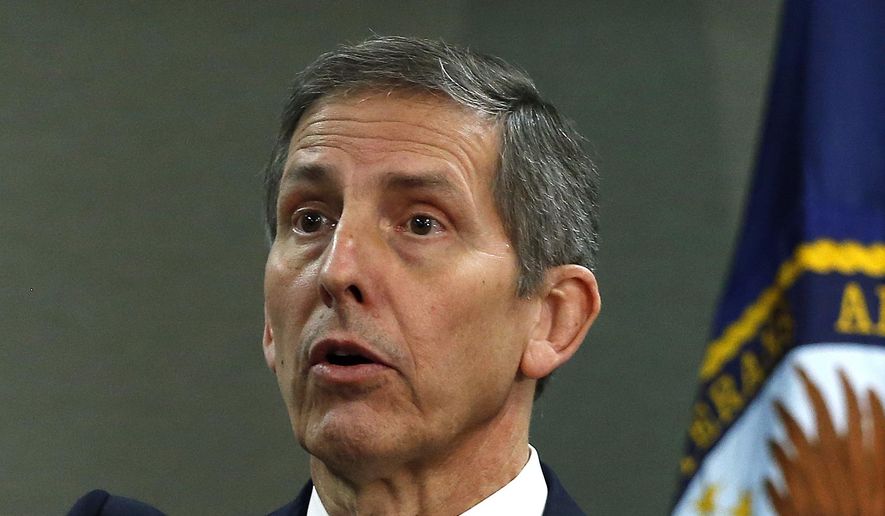Fed up with more than a year’s criticism, the Veterans Affairs Department lashed out at Congress, the press and its own internal watchdog on Wednesday, saying calls to fire bad workers won’t change things at the troubled department.
VA leadership said the House Veterans’ Affairs Committee was off base, the inspector general’s office exaggerated problems of mismanagement and poor treatment of veterans, and the media then “embellished” those reports — leaving the public with the erroneous impression of a department out of control.
Sloan Gibson, the department’s deputy secretary, took particular umbrage at calls from Congress and veterans groups for bad employees to be identified and fired, saying that was a poor way to judge himself and other department leaders.
“You can’t fire your way to excellence,” he said.
But House Veterans’ Affairs Committee Chairman Jeff Miller said the problem was that the VA itself had no idea how to measure progress and is still struggling to admit its own problems after dozens of offices were found to have maintained waiting lists that left veterans unable to get timely care they deserved.
In one egregious example from the Phoenix VA, a whistleblower last year said dozens of veterans died while stuck on the secret waiting lists.
SEE ALSO: Flakes’ ‘Wastebook: The Farce Awakens’ targets federal spending waste
More recently, the department’s inspector general said the VA was bilked out of nearly $400,000 in relocation bonuses by two senior executives who orchestrated their own transfers to new jobs.
The VA demoted them but says it has no legal tools to recoup the money, and Mr. Gibson stood by his decision not to fire the two, saying he was resisting public pressure in order to do what was right.
“We won’t administer punishment based on IG reports, referrals to the Department of Justice, recycled and embellished media accounts or external pressure,” he told the committee. “It’s simply not right, and it’s not in the best interest of the veterans we serve.”
He did say the VA would be changing its disciplinary process by no longer waiting for outside investigations to finish before administering in-house punishments — which can often take months or even years — and not putting employees on paid leave while the disciplinary process was ongoing.
Mr. Miller blasted VA leadership for suggesting that the congressional committee had exaggerated VA’s problems.
“Let me be clear, the constitutional role of Congress and this committee is to conduct oversight of the executive branch and your department, and we will ask the necessary questions and hold the necessary hearings to keep you in check,” Mr. Miller said. “That is basic government 101, and I’m starting to believe VA’s leaders somehow missed that lesson.”
SEE ALSO: White House threatens shutdown over anti-NLRB measure
Mr. Miller cited a series of cases of employees being placed on paid leave during administrative review or leaving before punishment could be doled out, including the case of a Louisiana VA nurse who was charged with manslaughter in the death of a patient.
Mr. Miller at one point also called Mr. Gibson’s testimony “pretty damn inconsistent” — drawing a rebuke from Rep. Corrine Brown, the ranking Democrat on the committee, who said she’d never seen that sort of profane outburst in 23 years of serving on the committee.
“I don’t know what has happened to this Congress and what has happened to the members. Let me just say, we are all here to serve the veterans,” she said, and encouraged members to keep perspective when asking questions related to the VA and not furthering their political agendas.
Rep. Tim Walz, Minnesota Democrat, said he had been encouraged by previous hearings where the VA presented positive plans for reform and change in the agency, but said that too many veterans had lost faith that the many systemic issues plaguing the department could be solved.
“I was so optimistic last week,” he said. “How is this all unraveling?”
Mr. Gibson insisted the VA is doing good work, and said it should not be overshadowed by things that go wrong from time to time in an agency with 350,000 employees.
“We acknowledge we’ve got some things we’ve got to do better, but routinely what happens is that all the good work that VA’s doing, all the progress that VA’s doing, winds up not showing up,” Mr. Gibson told reporters after the hearing. “The fact of the matter is that the leadership that the VA’s receiving today is making a result today. It’s making a tangible result.”
• Anjali Shastry can be reached at ashastry@washingtontimes.com.




Please read our comment policy before commenting.